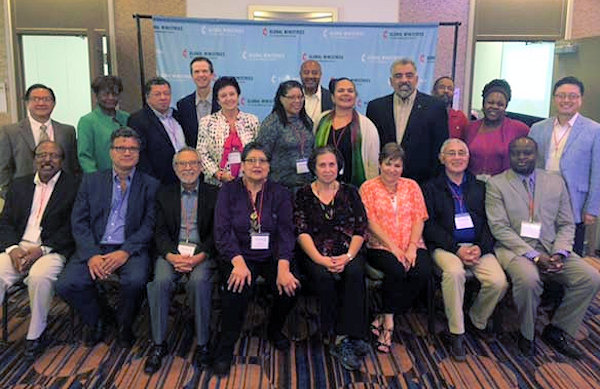UM Global Ministries recently hosted a roundtable focused on greater inclusiveness of diverse people.
Decatur, Georgia, September 23, 2016 — How does The United Methodist Church affirm and respond to growing racial/ethnic diversity in the United States, and how do those opportunities and challenges fit into the denomination’s global agenda?
These were overriding questions at an unprecedented mid-September meeting bringing together representatives of a wide range of ministry plans, caucuses, and historic programs geared to racial/ethnic communities in the U.S., some with global components. The September 15-16 event was hosted by the General Board of Global Ministries, the United Methodist worldwide mission agency, which has sponsored ministries with racial/ethnic groups within the U.S. since it was founded almost 200 years ago.
“More than two dozen participants came together as equals to explore ministry issues and options for the immediate future and long range,” said Thomas Kemper, the Global Ministries chief executive, who gave an opening presentation that covered the agency’s new regionalized operational vision and structure. This new structure includes a US regional office alongside offices covering the African, Asian/Pacific, and Latin American/Caribbean regions.
“We did not make specific program decisions so much as we plotted a course of collaboration among our diverse ethnic communities and with a major program agency of our church,” said the Rev. Dr. Mande Muyombo, the Global Ministries executive who oversees racial/ethnic ministries. “We formed a roundtable for reporting, listening, and responding with honesty and respect. We want the church to clearly understand that soon less than half of the U.S. population will be Anglo. We must prepare for tomorrow, and that means greater inclusiveness of diverse people.”
While a large majority of the 7.5 million United Methodists in the U.S. today are Anglo, the church already has considerate numbers of constituents and congregations of African American, Hispanic/Latino, Korean and other Asian American, Pacific Islander, and Native American heritages. There are six ethnically constituted “national ministry plans” and an equal number of unofficial ethnically constituted caucuses. In addition, Global Ministries has several ethnic program offices that were represented at the Decatur event.

A need for greater clarity on the distinct roles of plans, caucuses, and agency programs appeared multiple times on a list of issues to discuss with Global Ministries that was formulated in Decatur by dialogue groups. Other issues on the list included:
- The constant expansion of ethnic/racial diversity in the U.S., with the resulting need to be aware that the “margins” — as in “ministry with those on the margins” — constantly change.
- Possible expansion of the use of “missionary” as a service category in all ethnic ministry plans; currently missionaries are significantly built in to the Hispanic/Latino plan only (the Korean Plan has one missionary).
Other reports from dialogue groups stressed the need for the several racial/ethnic groups and plans to work together toward common goals of inclusiveness. They also affirmed the “globality of the racial/ethnic community” and praised the direction of Global Ministries in its regionalization process, and thanked the mission agency for its historical and future-directed emphasis on racial/ethnic ministries in the US.
The collaboration of Global Ministries, the ministry plans, and caucuses was affirmed at a service of Holy Communion. Bishop Elias Galvan (retired), executive director of MARCHA (Metodistas Asociados Representando la Causa Hispano-Americanos), who officiated at the service, called on all United Methodists to commit to racial/ethnic ministries. He also reminded the gathering of the important role the mission agency played in launching the several racial/ethnic ministry plans.
“We want the church to clearly understand that soon less than half of the U.S. population will be Anglo. We must prepare for tomorrow, and that means greater inclusiveness of diverse people.”
A subsequent letter to Global Ministries from the Inter-Ethnic Strategy Development Group expressed appreciation for the meeting in Decatur. Monalisa S. Tui’tahi, chair of the group and also affiliated with Pacific Islanders’ ministries, wrote of the value of the event as “we continue to care for this common work” and build on relationships “formed in reciprocity…nurtured through the years.”
The ministry plans are official church-wide initiatives funded by appropriations by the legislating United Methodist General Conference. Two plans, Strengthening the Black Church for the 21st Century and the Native American Comprehensive Plan, are administered by Discipleship Ministries (General Board of Discipleship) and four by Global Ministries. Those four are the National Plan for Hispanic/Latino Ministry, Asian American Language Plan, Korean Ministry Plan, and Pacific Islander Ministry Plan.
The caucuses represented, which are voluntary, membership-based organizations, were: Black Methodists for Church Renewal, Korean Association of The United Methodist Church, MARCHA, National Federation of Asian American United Methodists and Asian Language Ministries, Native American International Caucus, and Pacific Islanders National Caucus.
A Middle Eastern and North African United Methodist Caucus is newly formed.
Last Updated on December 8, 2023

